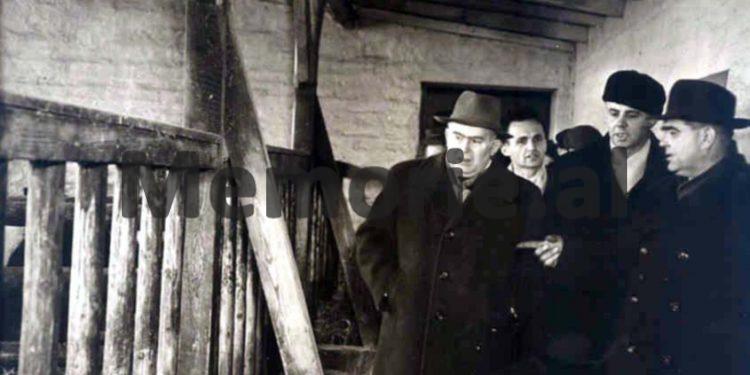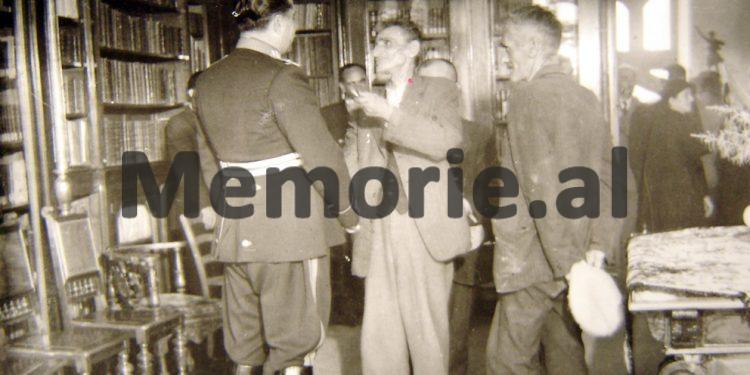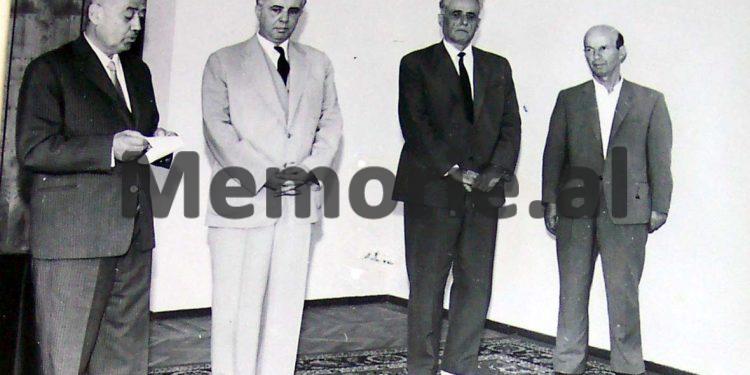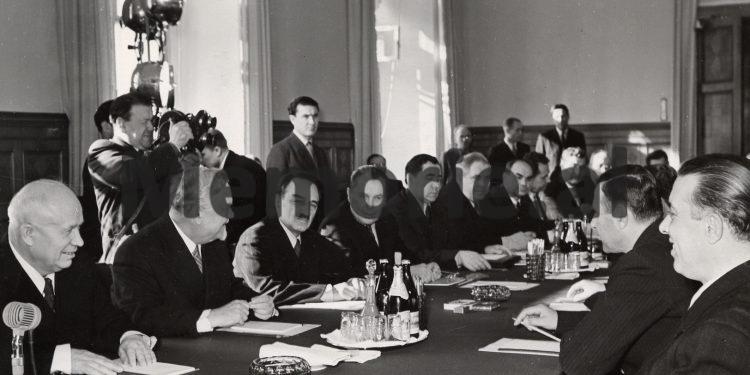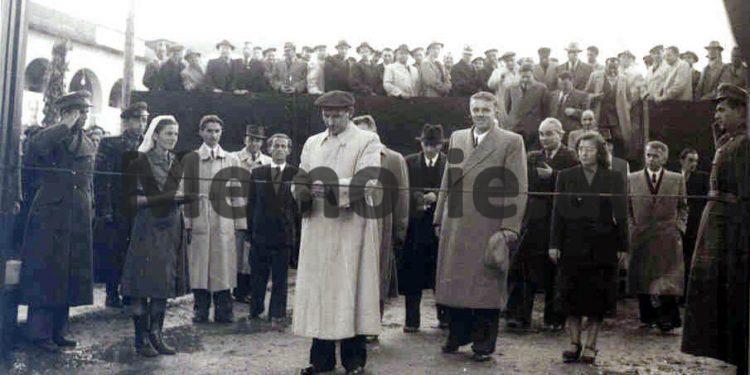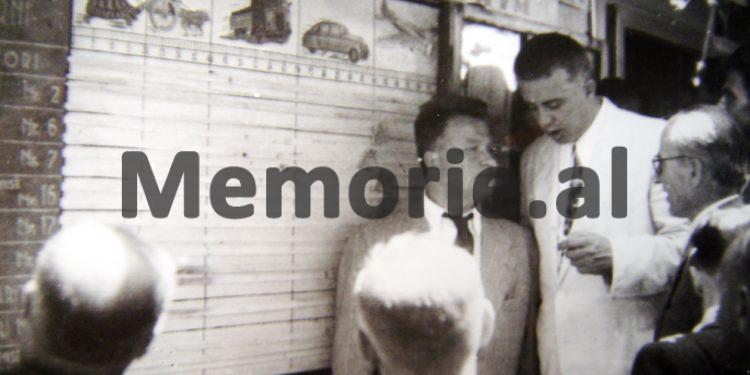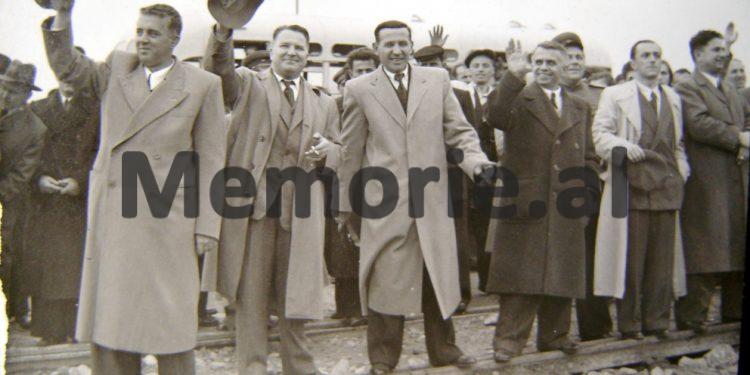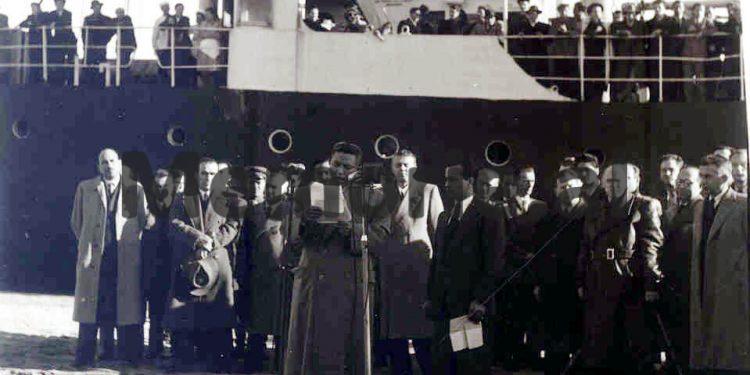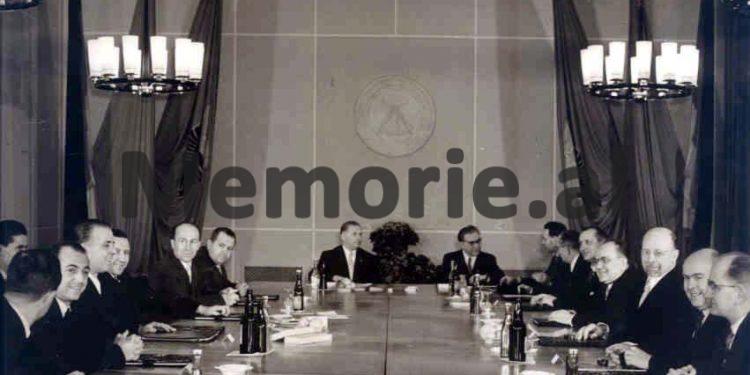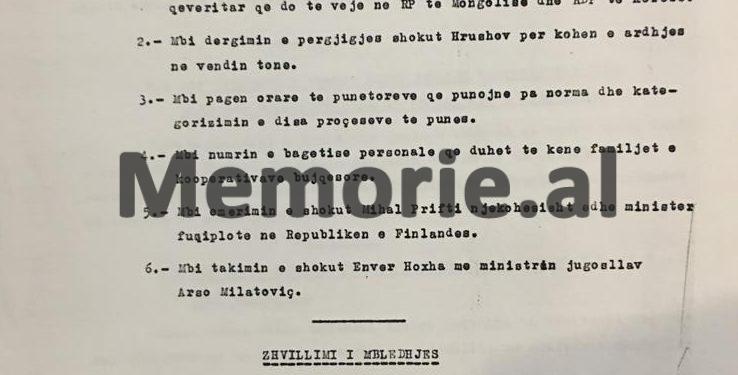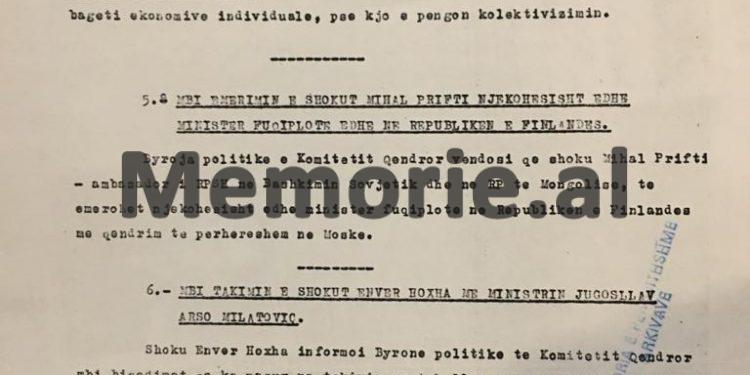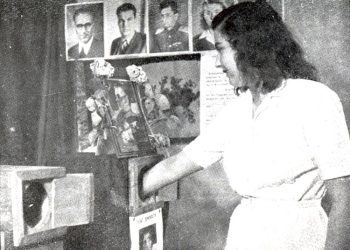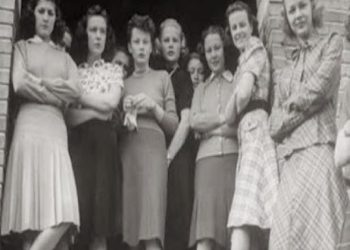Dashnor Kaloçi
Memorie.al publishes the minutes of the meeting of the Political Bureau of the Central Committee of the ALP held on August 15, 1956, where Enver Hoxha and the members of the Bureau discussed and decided to remove and limit the cooperative peasantry the number of cattle they kept in their yards. How did all the members of the Politburo agree with that decision and the opposition that was made only by Liri Belishova and her husband, Maqo Çomo, who at that time held the post of Minister of Agriculture…
I say that this picture that Maqua presented with the friends of the Ministry of Agriculture, is not in the spirit of collectivization of agriculture, it is for a good individual and does not allow you to move forward in accelerating collectivization. In my opinion no concessions should be made in this regard. Another issue is that the peasant, as vital has the land and then comes the cattle. When it comes to the Party persuading the peasant to join the cooperative, to bring in the land, this is a helpful thing. Then, for the desire that he has for the cooperative, we have to include it for the cattle, which is a subsidiary economy. “Then let’s take it concretely, there is no one to feed them, so it is better for us to look at where the collective cattle will graze than the individual one, because that is how we have two problems”.
This is what Enver Hoxha said, among other things, in his discussion, in one of the meetings of the Politburo of August 1956, when the senior communist leadership of the state party of that time, was analyzing the collectivization of the cooperative peasantry.
The archival document with the minutes of this meeting, which has been classified as “Top secret”, for years, becomes public after the declassification of a series of archival documents by the Central State Archive in Tirana.
Five other issues were discussed at that meeting, but in the article, we are publishing below, we are giving in full only part of the meeting where Enver Hoxha and other members of the Politburo of that time, discussed the removal of cattle from the yards of the cooperative peasantry.
This issue was not included in the agenda at all and was added as the last point of that meeting, which devoted only a few minutes to the former communist dictator of Albania, Enver Hoxha and the senior leadership of the state party he led. discussed and planned, which then led to the complete destruction not only of the Albanian peasantry, but of the whole country, leading Albania to the catastrophe which stopped only in the early 1990s with the fall of that regime, while the consequences would last long!
Minutes of the meeting of the Politburo of the Central Committee of the Albanian Labor Party.
On 15.8. 1956
The Political Bureau of K.Q. of the ALP. on 15 August 1956 considered the following matters:
- On the appointment of the party delegation that will take part in the VIII Congress of the KP of China, as well as the government delegation that will come to the RP of Mongolia and the RDP of Korea.
- On sending Comrade Hurshov’s reply to the time of his arrival in our country.
- On the hourly wage of workers working without norms and categorization of some work processes.
- On the number of personal livestock that the families of agricultural cooperatives should have.
- On the appointment of Comrade Mihal Prifti, at the same time a full-fledged minister in the Republic of Finland.
- On the meeting of Comrade Enver with the Yugoslav Minister, Arsa Milatovi..
On the number of personal livestock that the families of agricultural cooperatives should have
Comrade Enver Hoxha: Then we have the issue of livestock for the yards of agricultural cooperatives.
Comrade Hysni Kapo: In today’s statute of agricultural cooperatives is determined the amount of livestock for each yard. The commission in charge of studying the statute and the Ministry of Agriculture are of the opinion that the existing norm should remain the same. We saw this with the apparatus of the Central Committee, I also talked to comrades Muratov and Krylov and they were of the opinion that the rate that is today should be reduced. We intend to limit the number of livestock for each cooperative family. For example, from 1-4 cows or buffaloes, which are allowed to a cooperative family under the existing statute, to designate 1-2 cows or buffaloes. The same goes for sheep, etc., as presented in the report. If we consider other countries like Bulgaria and Romania, they have less. Therefore, we say that such a deduction can be made according to the statement that is presented. We now raise the question of why the draft statute of the cooperatives will be published and then it is not good for major corrections to be made in the congress. Those of the Ministry of Agriculture are afraid that this will cause a reluctance on the part of the villagers to enter the cooperatives.
Comrade Pilo Peristeri: They say we have no pasture.
Comrade Hysni Kapo: In addition to collective livestock, one should also think about feeding individual livestock. The job is for these to be to meet their needs. It happens to us today that some villagers have more individual livestock than the collected one. In popular democracies there are many limitations.
Comrade Maqo Çomo: We discussed this issue from the beginning to keep this number or not, although it is big. We think that this norm will be maintained again since we are in the phase of collectivization and this will make us keep what we have. We cannot compare Romania or Bulgaria, because they have 2-3 ha. personal garden land. We say that this issue should remain in the statute as it was, but we should put an article where it says that the assembly should decide the lowest number, and this is done with political work.
Comrade Gogo Nushi: I am of the opinion that we should reduce the number of personal livestock, as Comrade Hysni says, because the first is the issue of human occupation and the other is the issue of pasture for which we have to allocate large areas for pasture. I say it’s better to do this now, then then…
Comrade Rrapo Dervishi: We in Gjirokastra have had proposals to reduce the number of personal livestock, because it happened that the villager keeps the offspring and collectivizes the barren. At first this will have some resistance, but then it will be fixed. I do not call this measure as difficult for existing cooperatives, but for those to be set up.
Comrade Spiro Koleka: It seems to me that we should move away from what we have had, because these figures we have encourage those of private economies. If we look in Bulgaria, they reduced the number of cattle to one cow or buffalo, while we leave 1-2 cows or buffaloes, they have 3-5 sheep, and we leave 15-20 heads. I say that we decide according to the proposal of these friends and this is the way out based on the situation we have.
Comrade Beqir Balluku: I am also in favor of reducing the current number of personal livestock because the livestock of the yards are being returned to us in flocks and this will lead them to be more interested in their flock than in the cooperative.
Mrs. Liri Belishova: I think that we are now in the time of collectivization and at this stage we should favor the introduction of the peasantry in cooperatives. Then those of other countries are expanding it, and we are reducing their number. Auxiliary economy is a help to meet their needs and we are interested in that. As for the pastures, they have the opportunity to provide for themselves more easily and for the collectivized ones it is more difficult to feed them. Then why should we put this in administrative measures, if we are strong we can do it by persuasion.
Comrade Haki Toska: In Korça, most of the collectivized villagers have not reached these norms and are fighting to achieve them. I say that it is better to reduce this as soon as possible.
Comrade Rita Marko: Those from Bulgaria and Romania are used to cows, while our villager is used to sheep and counts a cow with 20 sheep. I think we should not rush and make this limit the sheep to a time that we should add.
Comrade Koço Theodhosi: Is it possible for a cooperative activist to keep 20-30 sheep, cows, pigs, etc. with the food he has?
Comrade Hysni Kapo: There is no possibility and there will come a time when we will provide him with food from the state. The thing is that today they do not have this figure and if we are going to correct it it is better to do it now, than later when we will have more dissatisfied.
Comrade Enver Hoxha: I say that this picture presented by Maqua with the friends of the Ministry of Agriculture, is not in the spirit of collectivization of agriculture, it is for a good individual and does not allow to move forward in accelerating collectivization. In my opinion no concessions should be made in this regard. Another issue is that the peasant has land as an important issue and then comes the cattle. When it comes to persuading the peasant to join the cooperative, to bring in the land, this is helpful. Then, for the desire that he has for the cooperative, we have to include it for the cattle, which is a subsidiary economy. Then to take it concretely, there is no one to feed them, so it is better for us to look at where the collective cattle will graze, than the individual one, because that gives us two problems. Now the pastures are numbered, on the one hand we have the directive of the Congresses and we have to open new lands. We will be interested in collectives. He has virtually no place to feed them. It is true that some people will be dissatisfied with this measure now, but tomorrow there will be more, so let’s do more now.
I say that it is in the interest of cooperativism, of the future, etc., for us to decide this. Therefore, I agree with what the companions of the apparatus propose, even I was with Spiron giving and the goats to be less, but better to remain according to the mirror that is presented.
In conclusion, the entire Political Bureau has agreed that the number of personal livestock of cooperative families should be according to the statement presented by the Central Committee apparatus.
Comrade Maqo Çomo: I understand what you are saying but I say that for today’s conditions it is not good to do.
Comrade Enver Hoxha: It is not right for you to say, if you leave more cattle to individual economies, why does this hinder collectivization.
In the end, it is decided that a protocol of the Politburo will be issued on this issue, which will be sent for notification to the first secretaries of the party committees of the districts and regions and the main cadres of the party and the state will be informed.
(The protocol on this issue was dictated by Comrade Enver and bears No. 26 / A, dated 15.8.1956)
Process holder Sadik Myftiu
(A.Q.SH. Fondi 14 / AP V.1956 d.47 fq.39)
Memorie.al




